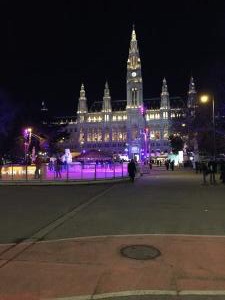Last week, on behalf of our client Alexander Khochinsky, an art dealer, we filed a petition to rehear en banc the June 18, 2021 decision by a three-judge panel affirming the dismissal of the lawsuit against Poland for lack of subject matter jurisdiction (i.e., sovereign immunity). The case invokes three provisions of the Foreign Sovereign Immunities Act, 28 U.S.C. § 1605 (the FSIA): the implicit waiver exception, the counterclaim exception, and the non-commercial tort exception. The basis on which we seek rehearing is simple: if the holding of the District Court and panel of the DC Circuit is the law, then no one is safe in the United States from any number of rogue regimes that abuse the extradition system for discriminatory and persecutory reasons.
Alexander Khochinsky Petitions DC Circuit to Rehear en banc His Holocaust Restitution Retaliation Case Against Poland
Topics: Alexander Khochinsky, Holocaust, extradition, FSIA, "Girl with Dove", Poland, Operation Barbarossa, Law and Justice Party, Judge Rakoff, SDNY
Heirs of Holocaust Victim Fritz Grünbaum Win Restitution of Nazi-Looted Schiele Drawings
The Appellate Division First Department in New York has affirmed the trial court’s ruling in Reif v. Nagy that the heirs of Viennese actor and Holocaust victim Franz Friedrich (Fritz) Grünbaum are entitled to the return of two Egon Schiele drawings, Woman Hiding her Face (1912) and Woman in a Black Pinafore (1911). The ruling is a momentous victory for the Grünbaum heirs, and features several recurring characters in many Nazi-looted restitution disputes. We were doubly gratified to see the First Department’s citation to our own case, Philipp v. F.R.G., 894 F.3d 406 (D.C. Cir. 2018) for the proposition that sales under duress are void and violate international law consistent with the policies of the Holocaust Expropriated Art Recovery (HEAR) Act of 2016. It is a landmark ruling and a testament to the perseverance of the Grünbaum heirs and their legal team.
Topics: Cornelius Gurlitt, Galerie St. Etienne, Nazi-looted art, Foreign Sovereign Immunities Act, Galerie Gutekunst, Holocaust, Fritz Grünbaum, NS Raubkunst, Egon Schiele, Mathilde Lukacs, Franz Kieslinger, Anschluss, Welfenschatz, HEAR Act, Ankerwycke, A Tragic Fate, Law and Ethics in the Battle Over Nazi-Looted Art, Holocaust Expropriated Art Recovery Act of 2016, Woman in a Black Pinafore, Woman Hiding her Face, Seated Woman With Bent Left Leg (Torso), Reif v. Nagy, D.C. Circuit Court of Appeals, Eberhard Kornfeld, Philipp v. F.R.G., New York Law Journal, Gutekunst & Klipstein, Jonathan Petropoulos
Deletion of Grünbaum Works from Lost Art Database Shows Again How German Government Has Lost Its Way on Nazi-Looted Art
The New York Times reported yesterday that the German Lost Art Foundation had removed several paintings once owned by the Viennese cabaret actor Fritz Grünbaum from the Lost Art database. While the history of these objects is hotly contested, it was a particularly strange choice given that Grünbaum’s heirs just won a judgment earlier this year that the works by Schiele must be returned to them—by reason of Nazi duress. For a database that has never been suggested as an adjudication of rights but rather as a repository of notice to the world of possible title issues, it was a perplexing choice. Against the backdrop of the party that the German government and the foundation are throwing themselves in November for which few outsiders have been able to register, the explanation appears much less benign particularly against the backdrop of the government’s historical revisionism in U.S. federal court litigation.
Topics: laches, Cornelius Gurlitt, Germany, Nazi-looted art, res judicata, Die Koordinierungsstelle für Kulturgutverluste, Holocaust, Magdeburg, Fritz Grünbaum, NS Raubkunst, Bavaria, Egon Schiele, Mathilde Lukacs, Task Force, New York Times, National Gallery, A Tragic Fate, German Lost Art Foundation, Kieslinger, Woman in a Black Pinafore, Woman Hiding her Face, Charles E. Ramos, Seated Woman With Bent Left Leg (Torso)
Alexander Khochinsky Files Suit Against Poland for Retaliation Related to WW II Property Claims
(WASHINGTON, D.C.-June 27, 2018) Alexander Khochinsky, the son of a Polish Jew who fled her home just steps ahead of the German invasion in 1941, has filed a lawsuit in the U.S. District Court for the District of Columbia against Poland for that country’s efforts to extradite him after he sought restitution of his mother’s property. Khochinsky, an art dealer, reached out to Poland about a painting, Girl with Dove by Antoine Pesne, that he had inherited from his parents and that looked similar to one that Poland was seeking, and asked to open a dialogue about what had happened to his mother’s home. In retaliation, Poland charged him with a crime and asked the United States to extradite him for prosecution. The U.S. District Court in Manhattan dismissed the request for extradition in 2015, but by then Khochinsky had suffered months of detention and the destruction of his business.
Topics: Alexander Khochinsky, Nazi-looted art, Red Army, Holocaust, extradition, "Girl with Dove", Sullivan & Worcester LLP, Antoine Pesne, Poland, Nicholas M. O'Donnell, Molotov-Ribbentrop Pact, Przemysl, Leningrad
Widespread Criticism Continues from Historians Over Germany’s and SPK’s Revisionism Concerning Holocaust and Forced Sales of Art
We reported last week on the outrage over the decision by Germany and the Stiftung Preussischer Kulturbesitz (SPK) to argue in their motion to dismiss my clients’ claims to the Welfenschatz that a commercial interaction between German Jews and a cabal instigated by Hermann Goering in 1935 “predated the Holocaust by several years.” As we noted last week, the suggestion that the Holocaust was a distant possibility in 1935 was an indefensible statement, factually, historically, and ethically. The initial reaction was swift and severe. As Germany gets ready to host the First Conference of the German Centre for Cultural Property Losses next week, its policies are hurtling in the wrong direction.
Topics: Jewish Week Mel Urbach, Hermann Goering First Conference of the German Cen, Gesetz zur Wiederherstellung des Berufsbeamtentums, Henning Kahmann, Atlanta, Simon Wiesenthal Center, Varda Neumann Federal Administrative Court, Yale University, Marion Kaplan, New York University, Germany, Nazi-looted art, Hitler, Kristallnacht Rabbi Abraham Cooper, Deborah Lipstadt, U.S. Holocaust Memorial Museum, Markus Stoetzel, Emory University, Behrens, Holocaust, Bloodlands, SPK, Advisory Commission, Black Earth: The Holocaust as History and Warning, Stiftung Preussischer Kulturbesitz, Restitution, Los Angeles, World War II, Law for the Restoration of the Professional Civil, Washington, Raubkunst, Timothy Snyder, Welfenschatz
Holocaust Revisionism in German Motion to Dismiss Guelph Claim Elicits Condemnation
Germany Runs Counter to 20 Years of International Commitments
As readers know, my clients Alan Philipp and Gerald Stiebel sued the Federal Republic of Germany and the Stiftung Preussischer Kulturbesitz (SPK) in February for restitution of the Guelph Treasure (or Welfenschatz as it is known in Germany), assisted by my co-counsel Mel Urbach, Esq. and Markus Stötzel of Marburg, Germany. As my co-counsel speak to an event tonight hosted by Congresswoman Grace Meng on the anniversary of Kristallnacht, an event inextricable to the persecution of Jews in Europe, Germany’s response to the Complaint advances a stunning revisionism about the Holocaust and the international commitments that Germany has made. While paying lip service to the seriousness of Jewish suffering, the papers filed in court are nothing less than an attempt to move the goalposts to exempt a historical period from responsibility about which there can be no serious debate. Independent condemnation was not far behind the filing.
Topics: Grace Meng, Simon Wiesenthal Center, Shoah, Adolph von Menzel, Hans Sachs, Washington Principles on Nazi-Looted Art, 1943 London Inter-Allied Declaration, Dachau, Holocaust, Mel Urbach, SPK, George Eduard Behrens, Nuremberg race laws, Holocaust revisionism, Stiftung Preussischer Kulturbesitz, Marburg, Restitution, Los Angeles, Gerald Stiebel, World War II, Markus Stötzel, Saemy Rosenberg, Deutsches Historisches Museum, Reichskristallnacht, Isaac Rosenbaum, Lucie Ruth Hackenbroch, Federal Republic of Germany, Zacharias Hackenbroch, Pariser Wochentag, Rabbi Abraham Cooper, Paris Weekday, Alan Philipp, Welfenschatz, Military Government Law 59, Frankfurt
Stephan Templ, Chronicler of Nazi Looting in Vienna, Set to Begin Jail Term Over Supposed Omission in His Mother’s Holocaust Restitution Claim
As I prepare for a trip to Vienna for next week’s International Bar Association Annual Meeting, there is some topical restitution news, but it is hardly good. The imminent incarceration of Stephan Templ, a journalist and historian, for the omission of another relative from his mother’s application for Holocaust compensation, is as bizarre as it is disheartening. One hopes that a pardon, his last available recourse, will soon be forthcoming.
Topics: Maria Altmann, Reibpartie, Robert Amsterdam, Portrait of Adele Bloch-Bauer, Der Standard, Stephan Templ, Nazi Looting, Scrubbing Parties, Ringstrasse, Ambassador Manz, Museum of Modern Art, Holocaust, Beethoven Frieze, Lothar Furth, Unser Wien: “Arisierung” auf österreichisch, Heinz Fischer, Restitution, Elisabeth Kretschmer, National Fund of the Republic of Austria for Victi, Egon Schiele, World War II, Eva Blimlinger, Portrait of Wally, Austria, The Missing Image, Natural History Museum, Ruth Beckermann, Gustav Klimt, Albertinaplatz, Our Vienna: “Aryanization” Austrian Style, Kurt Hankiewicz, Vienna, Anschluss, Baldur von Schirach, Limbach Commission, International Bar Association, Tina Walzer
Senate Appropriations Committee Bill Would Give Strong Backing To State Department on Holocaust-Era Assets
The United States Senate Appropriations Committee has passed its annual State Department appropriations bill, and it includes a strong instruction on Holocaust-era looted assets. The bill, entitled the Department of State, Foreign Operations, and Related Programs Appropriations Act, 2016 (S. 1725) was accompanied by the Committee’s report, which would direct the State Department to include in an annual report an assessment of U.S. domestic law and foreign countries’ status on their compliance with the Washington Principles and the Terezin Declaration. As the World Jewish Restitution Organization (WJRO) and the Conference on Jewish Material Claims Against Germany (Claims Conference) observed last year, that progress is mixed, at best. This is a budget bill, meaning it is just the first step in allocating resources for the U.S. government in the year to come (in this case, for the State Department).
Topics: Legislation, looted property, Office of the Special Envoy for Holocaust Issues, Terezin Declaration, S. 1725, Georg Baselitz, Washington Conference Principles on Nazi-Confiscat, 2009 Terezin Declaration, Holocaust, World Jewish Restitution Organization, Department of State Foreign Operations and Related, Report on International Religious Freedoms, 1998 Washington Conference on Holocaust-Era Assets, WJRO, Restitution, Nazi-looted, Secretary of State, World War II, United States Senate Appropriations Committee, Gerhard Richter, Washington Principles, Conference on Jewish Material Claims Against Germa
Herzog Case Against Hungarian Museums Focuses on Issues to Be Appealed
With the recent decision in the Baron Herzog case dismissing some claims but allowing the bulk of the case to go forward, the next step is determining what issues can be appealed now.
Topics: Hungary, Holocaust, Restitution, Statute of Limitations, World War II, Foreign Sovereign Immunities
Hungarian World War II Restitution Case Will Go Forward
The United States District Court has allowed significant parts of the claim brought by claimed heirs of Baron Mor Lipot Herzog to go forward. The decision is significant for several reasons. First, it is the most prominent restitution case currently at the trial level, and the case will now proceed into discovery of the facts. Second, the judge turned away a strong statute of limitations argument, which has been the strong trend in recent restitution cases. On the flip side, the judge found for the defendants on eleven paintings that were the subject of prior litigiation.
Topics: Hungary, Holocaust, Restitution, Statute of Limitations, World War II, Foreign Sovereign Immunities








